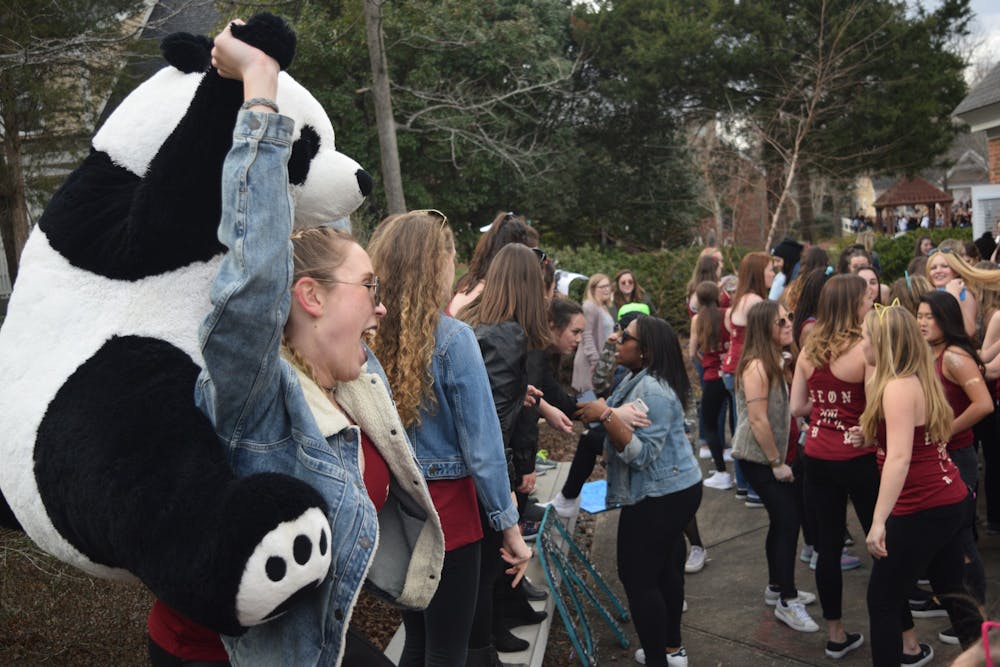Greek life organizations, the Panhellenic and Interfraternity Councils, are now working to revise their plans for recruitment after Elon University ordered all fraternity and sorority activity to move to completely virtual environments. The order, issued to greek organizations Sunday, aims to limit small group interactions amid the coronavirus pandemic after multiple reports of parties and unmasked social gatherings.
The decision comes one week before sororities are set to begin spring recruitment. While most of the recruitment process was supposed to occur virtually, bid day — the time when sororities offer an invitation to women to join — had an in-person element.
Greek organizations still have the opportunity to host other smaller, approved in-person events that are registered through Phoenix Connect for service and scholarship.
Dean of Student Development Jodean Schmiederer said the decision to keep bid day virtual stemmed from recent reports of parties and unmasked gatherings hosted by greek organizations.
“When you do individual chapter activities that are in-person, it means you’ve got one chapter doing something and it’s much more manageable [than] having 700 to 600 women all on one day trying to come together,” Schmiederer said.
Delta Delta Delta president Sam Hess, who is a reporter for Elon News Network, is disappointed the decision to move bid day online came so late.
“I also think there’s this frustration of, we’re putting on a recruitment that we have had a month to work on on a completely new platform,” Hess said. “We want to get to know our new members. We want them to have the best new member experience possible. But now with this information a week before recruitment starts, it’s kind of like, OK, how do we adopt this plan that we already had in place to give them the best new member experience possible?”
Another element of the new order restricts opportunities for members of a greek organization to meet with new members. Schmiederer said there is concern about introducing new members to existing social circles, potentially further spreading the virus.
“Our hope is that we can lift this as we go throughout the semester, and you’ll be able to meet in-person with the new members and your social group will be able to expand, even in-person,” Schmiederer said. “But we need to do it in a way that’s respectful of the dangers that the virus presents.”
Since the start of the fall semester, a significant number of cases have been tied to at least four fraternities and four sororities. Several greek organizations have also been identified as clusters, when five or more individuals are epidemiologically linked to a virus outbreak.
While other student organizations have also had to pause in-person activities, Schmiederer said sororities and fraternities pose a particular challenge as they are larger than most organizations.
“More students are impacted because more students are involved in a fraternity or sorority in that cluster than in other activities,” Schmiederer said.
Hess said she acknowledges individuals in greek life have significantly contributed to the rise of coronavirus cases on campus. However, she said she’s concerned about the new member experience moving forward now that there are restrictions on meeting them in-person after recruitment.
“I think a lot of freshmen and sophomores going through recruitment right now are looking to go on those sister dates,” Hess said. “[They’re] looking to create this, you know, not even necessarily in-person connection, but I mean, it’s hard to find like a greek family when you’re only talking to them via Zoom.”
Schmiederer said potential new members’ expectations of the recruitment process is different than the experience upperclassmen have previously had with the process.
“[Potential new members] will have a very good experience, and they’ll get a chance to meet people and feel connected,” Schmiederer said. “It just looks different than what our upperclassmen may hope that it would look like.”


